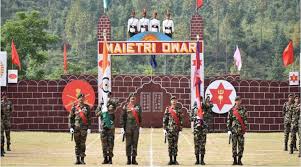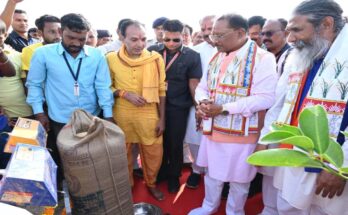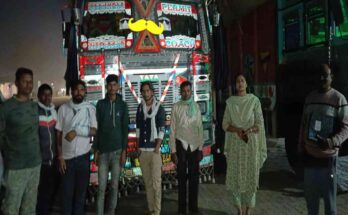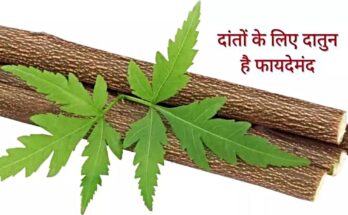New delhi June 25 , 2020. The present chill in the Indo-Nepal relations is a passing phase and the strong military-to-military ties between the two countries will help tide over the crisis, feel Army veterans.
Former army chief Gen VP Malik (retd), who has dedicated a chapter to Nepal in his book ‘India’s Military Conflicts & Diplomacy’, recounts how India’s military connection with the Himalayan country goes back to the reign of Maharaja Ranjit Singh whose army in Lahore enlisted Nepalese soldiers called Lahure or soldiers of fortune.
Today the Indian Army has seven Gurkha regiments with five to six battalions each. Lt Gen Depinder Singh (retd), commander of IPKF (Indian Peace Keeping Force) in Sri Lanka, and a Gurkha officer, says it’s the largest number of soldiers from any single group.
In a convention that goes back to 1972, and is arguably unique to the two neighbours, the Army chief of India is the honorary chief of the Nepalese army and vice-versa.
“You cannot doubt either the bravery or loyalty of Gurkha troops from Nepal,” says Col JS Thapa (retd), a fifth generation officer of the 3rd Gurkha Rifles raised in 1840, telling you how the British woke up to Nepalese warriors in 1815 when the latter captured territories in Kumaon, Garhwal and Himachal Pradesh. A year later, the East India Company signed the Treaty of Sugauli with them, delineating the boundaries of Nepal.
By 1840, the British had started raising Gurkha regiments, and when India gained independence, these were divided between the British and Indian armies as per a tripartite agreement signed with Nepal in November 1947. Six Gurkha regiments with a lakh-odd soldiers came to India, which raised another regiment later.
Lt Gen DS Hooda (retd), the Northern Army commander during the surgical strikes of 2016, who was commissioned into 4th Gurkhas, vouches for the strong inter-personal ties between the soldiers and officers of the two countries due to the Gurkha regiments. “Every year, our battalions commission a tour of Nepal. Young officers from India trek to traditional recruiting areas in the rugged Himalayas, meet the locals, and often live in villages with ex-servicemen.”
Both the officers and troops are fiercely proud of their war cry ‘Jai Maha Kali, Ayo Gorkhali’ , the khukri, and their command over Gurkhali language. Lt Gen Depinder recalls how in the initial years after independence, any officer who could not master Gurkhali in three months was shifted to another regiment.
Gen Malik writes that even though King Birendra Bir Bikram Shah Dev, who was coronated in 1972, had a leaning towards China, he could not impact the soldier-to-soldier ties between the two nations. It is a sentiment echoed by Gen Bikram Singh (retd), former army chief who retired in 2014.
Brig JS Pama (retd), who commanded the Gurkha Regimental Centre at Varanasi, says the regiments are known to nurture their ex-servicemen in Nepal. “They enjoy the same medical facilities as the Indian soldiers, and often medical teams from Indian Army tour Nepal. Unlike the British, who started giving them pension only a few years ago, the Indian Army has never discriminated against the Nepalese soldiers, who can avail of healthcare facilities in India as well. We also run welfare projects in villages, including small water and power projects,” says Pama.
The Nepalese army also sends its officers for training to India’s military academies and combat colleges. Hooda says such is the mobility between the two counties that a Nepalese youngster can take the National Defence Academy or Combined Defence Services exams and join the Indian army as an officer. Col Lalit Rai, who received a Vir Chakra for the bravery of his battalion, the 1/11 Gurkha Rifles, during the Kargil war, is one such officer of Nepalese descent.
The veterans are one in their praise of Gurkha valour. “They are outstanding soldiers, we must acknowledge their contribution to the various wars that we have fought,” says Hooda. In the 1971 war, for instance, they pioneered the amphibious operations. “There is no war in which they have not taken part and acquitted themselves gloriously,” says Singh.
In their book ‘Field Marshal Sam Manekeshaw, The Man and His Times’, Brig Behram M Panthaki (Retd), a Gurkha officer, and his wife Zenobia Panthaki recount the pride Manekshaw, who was moved to the 8th Gurkha Rifles after Partition, took in being called Sam Bahadur, a nickname given to him by his troops. On his part, Manekhaw once famously said, “If anyone tells you he is never afraid, he is either a liar or a Gurkha.”
The veterans are hopeful that the Gurkha troops in Nepal will not let any poison creep into the people-to people relationship between the two nations. “Gurkha ex-servicemen are a very large, prosperous and influential constituency in Nepal who have a strong allegiance to India,” says Hooda, while Lt Gen Depinder points to the heavy flow of remittances from India to Nepal.
“There will always be ups and downs between neighbours, wisdom lies in sitting and talking it out. Give a little and take a little. Any trade embargo will only drive them to China,” he advises.
As television channels speculate about Nepal’s growing tilt towards China, Col Thapa has no doubts about the loyalty of his troops. As he puts it, “Gaddari nahin ho sakti.”




